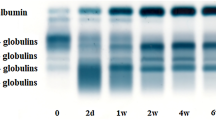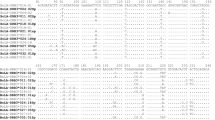Abstract
OUT of about 2,500 cattle sera examined during the past two years by starch gel electrophoresis1, two individuals were found which lacked a slow alpha (Sα) protein zone (Fig. 1). Both animals were Guernsey cattle, one a five-year-old cow and the other her twelve-month-old heifer calf. This suggests that the condition is inherited. The herd from which the cow originated was examined for the absence of Sα-proteins. The part of the pedigree which is relevant is shown in Fig. 2.
This is a preview of subscription content, access via your institution
Access options
Subscribe to this journal
Receive 51 print issues and online access
$199.00 per year
only $3.90 per issue
Buy this article
- Purchase on Springer Link
- Instant access to full article PDF
Prices may be subject to local taxes which are calculated during checkout
Similar content being viewed by others
References
Ashton, G. C., Nature, 180, 917 (1957).
Poulik, M. D., and Smithies, O., Biochem. J., 68, 636 (1958).
Author information
Authors and Affiliations
Rights and permissions
About this article
Cite this article
ASHTON, G. Lack of ‘Slow-Alpha’ Proteins in some Guernsey Cattle. Nature 182, 193–194 (1958). https://doi.org/10.1038/182193a0
Issue Date:
DOI: https://doi.org/10.1038/182193a0
This article is cited by
-
Untersuchungen zur Phylogenetik der Pseudocholinesterasen
Human Genetics (1964)
-
Polymorphism in the Serum Post-albumins of Cattle
Nature (1963)
-
Die Haptoglobintypen Methodik ihrer Bestimmung, Allelenhäufigkeit in einigen Stichproben
Blut Zeitschrift für die Gesamte Blutforschung (1961)
Comments
By submitting a comment you agree to abide by our Terms and Community Guidelines. If you find something abusive or that does not comply with our terms or guidelines please flag it as inappropriate.



